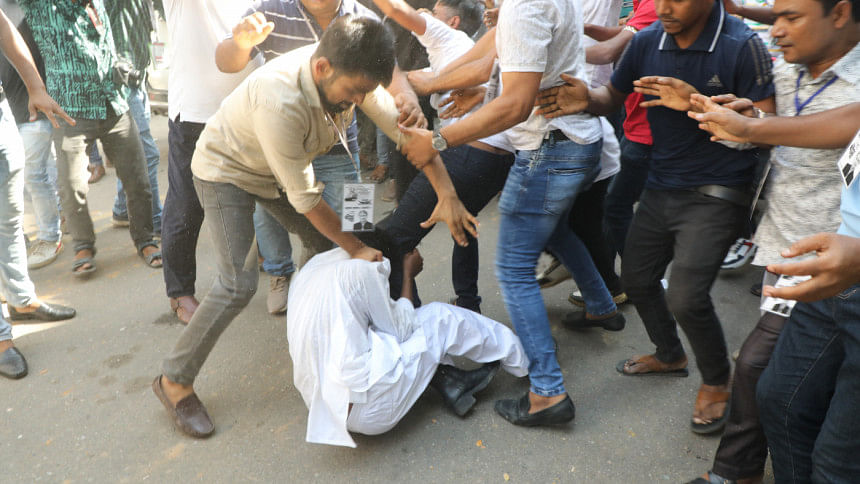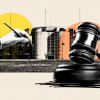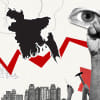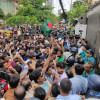What message emanates from the attack on Hero Alom?

The shocking assault on Ashraful Alom (better known as Hero Alom), who is largely deemed a political and cultural outcast, that took place in the poshest neighbourhood of our capital has been termed as "unfortunate" by Election Commissioner Md Alamgir. His narration of events taking place at the Banani Bidyaniketan School and College polling centre is completely different from what the media have reported, and what more than a dozen video clips available on social media platforms show. One may wonder from where the commissioner got his briefing.
While speaking to reporters at the Election Commission, Alamgir admitted that the EC was yet to know the actual picture, but happily blamed Hero Alom for the whole incident. Election Commissioner Md Alamgir said, "An independent candidate tried to enter a polling centre with his supporters and at least 70 YouTubers." According to him, as police tried to stop them, the candidate engaged in an altercation with the law enforcers. He also said, "The incident did not take place inside the polling station. Some people chased him when he came out onto the road and may have assaulted him."
His suggestion that the incident took place outside the centre was quite similar to the response a police officer at the centre had given to journalists when asked why law enforcers were not rescuing Hero Alom from the attackers. In video footage, the same police officer could be heard saying that he and his team were responsible for the cordon inside the polling centre and incidents outside the centre were outside their remit. Shockingly, a number of video clips showed members of the police team responsible for inner cordon escorting Hero Alom from the main building to the school gate and leaving him there without arranging further escort, despite the fact that there was greater danger awaiting him. It was almost like handing the candidate over to a hostile mob. This happened despite the Dhaka Metropolitan Police Commissioner's pledge to ensure peace and maintain law and order in Dhaka-17 constituency.
Unfortunately, Election Commissioner Alamgir's statement could be termed as a seal of approval of police's partisan behaviour. It also raises a crucial question about the EC's ability and willingness to be responsible for maintaining law and order and ensuring the physical safety of candidates during elections.
Monday's incident was not the first time that Hero Alom has been subjected to physical assault. He was also assaulted on the very first day of his official campaigning, and we haven't heard anything about bringing the perpetrators to justice. Previously, Hero Alom was also assaulted in 2018, while visiting a polling centre of the Bogura-4 constituency, allegedly by members of the ruling Awami League. He, however, became a serious contender during the by-poll in the same constituency four years later in February this year, and lost only by 834 votes.
Hero Alom may have been ostracised by our political and cultural elites, but he has a huge fan base among the poor and working class. Last year, he was summoned by police for covering a Tagore song, because some people alleged that Alom was desecrating the sanctity of our culture. There's little doubt that he doesn't have what it takes to be a soft and sophisticated singer, but that doesn't mean his coarse voice has to be suppressed. He may also lack all the traits required to become a politician, but his right to aspire to become one must not be denied. As for those who decry Hero Alom's rise by saying it's the result of a famine of creativity or sophistication, their argument for cultural elitism sadly supports suppression and repression by the state or by those who have authority.
The attack that we witnessed against Hero Alom in Banani on Monday bore the resonance of such suppression, especially when the attackers were heard saying, "He does Tiktok, he is a joker, why does he want to be the MP of Gulshan-Banani? Does he know what 'MP' means?" As the attackers were wearing the boat symbol, representing the ruling Awami League, are we to assume that they believe the right to aspire to become a MP is reserved only for those who belong to their party?
The attack also reveals that Hero Alom was being seen as the lone challenger who really had a chance of beating the AL candidate, regardless of his social standing, educational background, and lack of a party's backing. Otherwise, why would they have picked a fight with Alom and not with the other candidates, including the Jatiya Party nominee?
Many may argue that it was a blunder committed by some fringe elements of the ruling party. But that makes for a very weak argument, as party managers were fully aware of the importance and significance of having a clean and untainted by-poll at the constituency which houses almost all Western diplomatic missions. These are the missions that have been calling for a free, fair, and peaceful national election and not a repetition of either the one-sided affair of 2014 or the alleged pre-polls, nighttime ballot-stuffing of 2018. Furthermore, this incident happened within a week of the prime minister's assurance to a US delegation that the government will ensure a free and fair election.
So, how does one explain this violence unleashed against a rival candidate? Could it be that the government has decided to ignore the international community's concerns and is thinking about forcing through a one-sided election, if the BNP and other parties decide to boycott it? After all, the EC's inability to conduct a by-poll fairly and peacefully, could push the European Union to not deploy observers. This, in turn, could help the ruling party surpass increasingly close international scrutiny. Is this not what we had witnessed in 2018?
Kamal Ahmed is an independent journalist. His Twitter handle is @ahmedka1

 For all latest news, follow The Daily Star's Google News channel.
For all latest news, follow The Daily Star's Google News channel. 












Comments